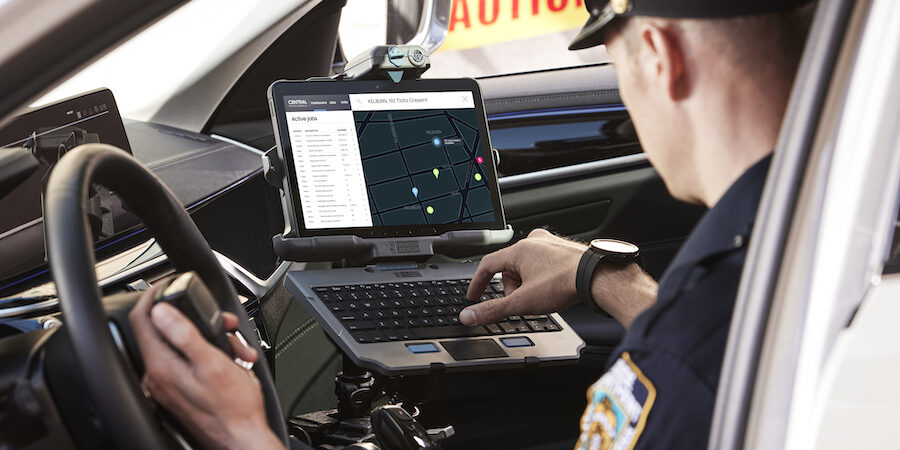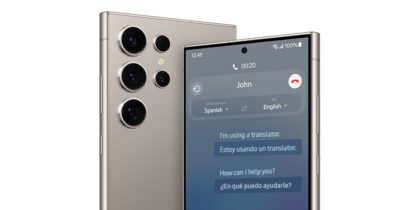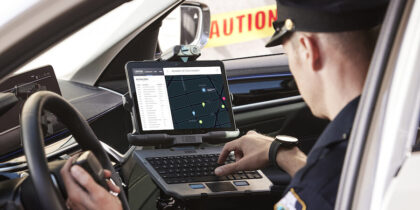Across the U.S., public safety agencies have found that a mobile-first approach increases overall officer effectiveness by providing always-on, ready access to real-time information and improved situational awareness.
The sheer utility of a mobile device means field personnel are no longer dependent on a vehicle-mounted computer and can more effectively engage the community, regardless of their proximity to a patrol vehicle. When combined with the Samsung DeX platform, smartphones can replace in-vehicle computers as well as desktops, meaning a single device can now support in-vehicle, in-field and in-station operations. With DeX, mobile applications are optimized to take full advantage of a larger display instead of simply stretching the smartphone interface, thus providing a much more effective user experience.
An officer can use a smartphone in the field for queries or evidence collection, then dock the device via DeX in the patrol vehicle to make use of computer-aided dispatch (CAD) and geolocation functions. Upon return to the station, DeX can pair the same smartphone with a full-size keyboard and display in the report writing room.
When the department’s mobile management infrastructure is properly designed, the officer’s smartphone is moving through environments while staying inside a secure architecture that supports full interaction with criminal justice and departmental systems. In fact, officers using a DeX-capable phone for report writing can drop pictures from the phone right into the report and, using the agency’s internal network, move those photos to a secure evidence server. Throughout the workday, a single smartphone gives officers the functional equivalent of a range of devices, such as a scanner, video recorder, audio recorder and camera.
The mobile device itself, of course, needs to be durable and reliable. Samsung’s rugged mobile devices, such as Galaxy XCover6 Pro and Galaxy Tab Active4 Pro, are ideal not just for their integration with Samsung DeX, but also for their long-lasting battery power and hardwearing design. Either option can work as a scanner and walkie-talkie in addition to being a powerful and portable mobile device for officers.
The new paradigm is forming
There’s a convergence of technology occurring in public safety comprising expanding broadband capabilities, rapid updating of mobile-capable software (e.g., CAD and records management systems) and increased use of smartphones by officers in the field. Public safety data transmissions are being prioritized to ensure mission-critical information gets through.
The ongoing rollout of 5G provides transmission speeds unlike anything seen before, easily supporting the use of high-resolution photos and videos along with real-time situational awareness based on location and remote sensor data. All of this furthers the concept of a connected officer, and agencies will be the beneficiaries of these developments — especially those that integrate DeX with their operations.
The Public Safety Network conducted an in-depth case study of Samsung DeX. The report, titled “Bringing Mobile First to Public Safety,” provides a detailed discussion of the capabilities that can be realized by using the DeX platform. The report also provides a detailed cost analysis and documents the potential savings of transitioning to a DeX-enabled operation. The DeX-in-vehicle solution was piloted by the Chicago Police Department, and more recently, DeX brought a whole new layer of opportunity to the Santa Barbara Police Department.
By leveraging existing telecommunications infrastructure, the associated incremental costs to agencies are minimized because the economies of scale are already built into the supporting network. The total cost of ownership for a DeX-based operation is significantly lower than the cost of managing a collection of technologies that includes traditional desktops, in-vehicle computers and handheld devices. The analysis found that a cost reduction of more than 15% could be realized in the first year of DeX utilization, with savings of approximately 30% likely for each of the following two years — savings that could be reallocated to other public safety priorities. Better yet, these savings occur while operational capabilities are being expanded, not downsized.
Easier to support
A DeX-based environment provides efficiencies related to IT maintenance and support. Managing fewer devices, combined with the ability to remotely update those devices, results in significant IT savings and ensures timely installation of updates and patches. This, in turn, improves cybersecurity for the agency. Security is further assured because the mobile devices are protected by Samsung’s defense-grade Knox platform, which provides overlapping defenses against intrusion and malicious threats. Knox is particularly adept at protecting stored data because the security is built in at the chip level.
Increase situational awareness in public safety
Learn how to enable situational awareness for everyone with the use of the powerful mobile app ATAK. Download Now
Additional Knox solutions include powerful mobile device management (MDM) and enterprise mobility management (EMM) capabilities that allow agencies to put in place safeguards required by Criminal Justice Information System policies. Other security features on Samsung’s rugged smartphones and tablets include full-disk encryption, biometric sensors and extensive integration with MDM and EMM applications. This multifaceted approach significantly lowers the overall risk of a compromised device or a security incident.
Police officers are one of the most mobile work groups due to the nature of patrol operations. A mobile-first approach allows officers to stay connected and engaged, thereby untethering them from their patrol cars. DeX brings a whole new layer of opportunity to agencies that want to make the most of today’s technology and provide a powerful force multiplier to their field personnel.
Visit Samsung’s Mobile First Responder page to learn more about empowering officers in the field and improving situational awareness. To estimate the potential savings you can achieve by going mobile-first with Samsung DeX, try our cost calculator tool.








